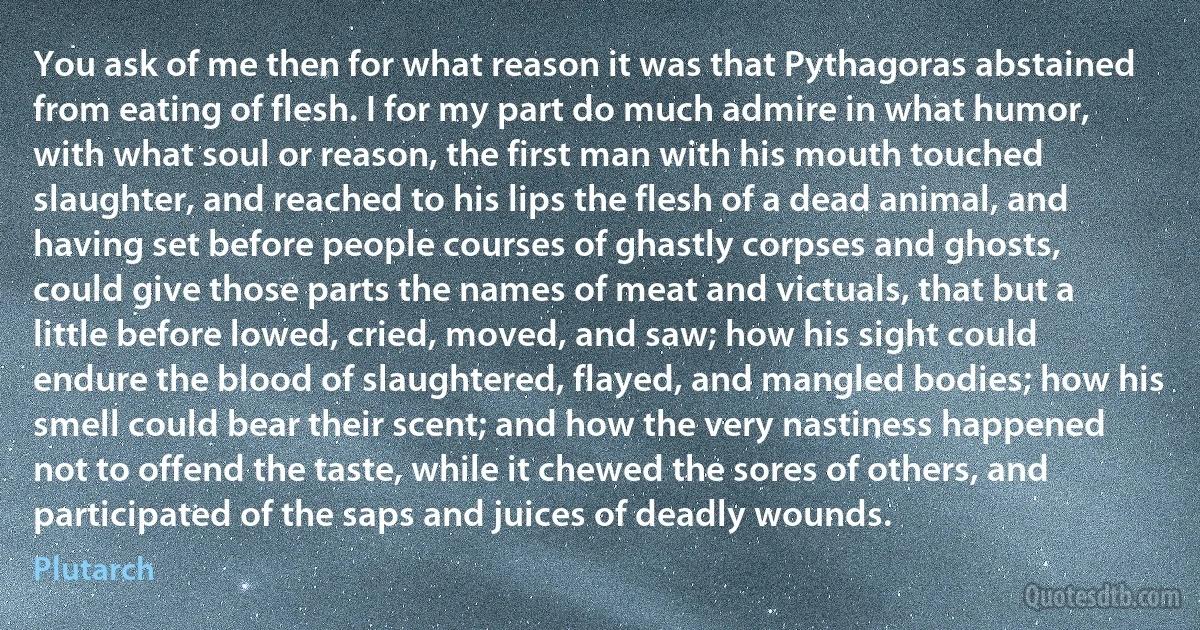
You ask of me then for what reason it was that Pythagoras abstained from eating of flesh. I for my part do much admire in what humor, with what soul or reason, the first man with his mouth touched slaughter, and reached to his lips the flesh of a dead animal, and having set before people courses of ghastly corpses and ghosts, could give those parts the names of meat and victuals, that but a little before lowed, cried, moved, and saw; how his sight could endure the blood of slaughtered, flayed, and mangled bodies; how his smell could bear their scent; and how the very nastiness happened not to offend the taste, while it chewed the sores of others, and participated of the saps and juices of deadly wounds.
PlutarchRelated topics
animal ask bear blood cry dead eating flesh having man meat mouth nastiness people reason saw scent set sight slaughter smell soul taste while others names lips parts pythagoras sapsRelated quotes
Do everything simply and meekly. Do nothing with an ulterior motive. Don't say, I'll do this in order to have that result, but do it naturally, without taking cognizance of it. That is, pray simply and don't think about what God will bestow on your soul. Don't make any calculations. You know, of course, what God bestows when you enter into communion with Him, but it is as if you don't know. Don't discuss the matter even with yourself. So when you repeat the prayer, "Lord Jesus Christ, have mercy on me”, say it simply and ingenuously and think of nothing other than the prayer. These are very delicate matters and the intervention of the grace of God is required.

Porphyrios of Kafsokalyvia
Superstition is another mighty evil, and has caused much terrible cruelty. The man who is a slave to it despises others who are wiser, tries to force them to do as he does. Think of the awful slaughter produced by the superstition that animals should be sacrificed, and by the still more cruel superstition that man needs flesh for food. Think of the treatment which superstition has meted out to the depressed classes in our beloved India, and see in that how this evil quality can breed heartless cruelty even among those who know the duty of brotherhood. Many crimes have men committed in the name of the God of Love, moved by this nightmare of superstition; be very careful therefore that no slightest trace of it remains in you.

Jiddu Krishnamurti
Man's carnivorous nature is not taken for granted, or praised in the fundamental teachings of Judaism. The rabbis of the 111:32). The implication is clear, that Judaism was engaged in weaning men from such practices. Judaism as a religion offers the option of eating animal flesh, and most Jews do, but in our own country there has been a movement towards vegetarianism among very pious Jews. A whole galaxy of central rabbinic and spiritual teachers including several past and present Chief Rabbis of the Holy Land, have been affirming vegetarianism as the ultimate meaning of Jewish moral teaching. They have been proclaiming the autonomy of all living creatures as the value which our religious tradition must now teach to all of its believers.

Arthur Hertzberg
The votaries of Pythagoras of Samos have this story to tell of him, that he was not an Ionian at all, but that, once on a time in Troy, he had been Euphorbus, and that he had come to life after death, but had died as the songs of Homer relate. And they say that he declined to wear apparel made from dead animal products and, to guard his purity, abstained from all flesh diet, and from the offering of animals in sacrifice. For that he would not stain the altars with blood; nay, rather the honey-cake and frankincense and the hymn of praise, these they say were the offerings made to the Gods by this man, who realized that they welcome such tribute more than they do the hecatombs note and the knife laid upon the sacrificial basket.

Philostratus
I who am blind can give one hint to those who see - one admonition to those who would make full use of the gift of sight: Use your eyes as if tomorrow you would be stricken blind. And the same method can be applied to other senses. Hear the music of voices, the song of a bird, the mighty strains of an orchestra, as if you would be stricken deaf to-morrow. Touch each object you want to touch as if tomorrow your tactile sense would fail. Smell the perfume of flowers, taste with relish each morsel, as if tomorrow you could never smell and taste again. Make the most of every sense; glory in all the facets of pleasure and beauty which the world reveals to you through the several means of contact which Nature provides.

Helen Keller
